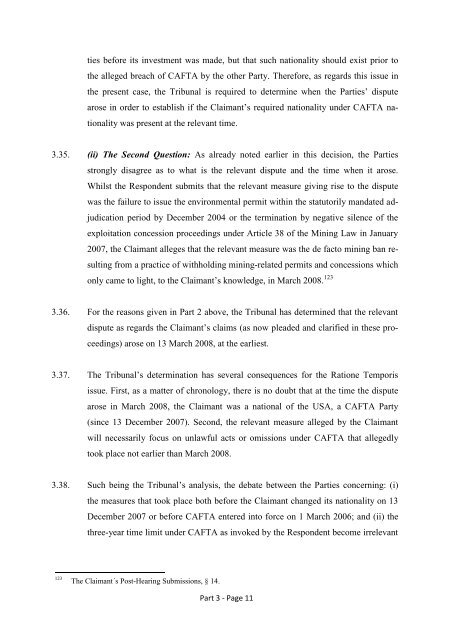brought under the dominican republic - central america - ita
brought under the dominican republic - central america - ita
brought under the dominican republic - central america - ita
You also want an ePaper? Increase the reach of your titles
YUMPU automatically turns print PDFs into web optimized ePapers that Google loves.
ties before its investment was made, but that such nationality should exist prior to<br />
<strong>the</strong> alleged breach of CAFTA by <strong>the</strong> o<strong>the</strong>r Party. Therefore, as regards this issue in<br />
<strong>the</strong> present case, <strong>the</strong> Tribunal is required to determine when <strong>the</strong> Parties‟ dispute<br />
arose in order to establish if <strong>the</strong> Claimant‟s required nationality <strong>under</strong> CAFTA nationality<br />
was present at <strong>the</strong> relevant time.<br />
3.35. (ii) The Second Question: As already noted earlier in this decision, <strong>the</strong> Parties<br />
strongly disagree as to what is <strong>the</strong> relevant dispute and <strong>the</strong> time when it arose.<br />
Whilst <strong>the</strong> Respondent submits that <strong>the</strong> relevant measure giving rise to <strong>the</strong> dispute<br />
was <strong>the</strong> failure to issue <strong>the</strong> environmental permit within <strong>the</strong> statutorily mandated adjudication<br />
period by December 2004 or <strong>the</strong> termination by negative silence of <strong>the</strong><br />
explo<strong>ita</strong>tion concession proceedings <strong>under</strong> Article 38 of <strong>the</strong> Mining Law in January<br />
2007, <strong>the</strong> Claimant alleges that <strong>the</strong> relevant measure was <strong>the</strong> de facto mining ban resulting<br />
from a practice of withholding mining-related permits and concessions which<br />
only came to light, to <strong>the</strong> Claimant‟s knowledge, in March 2008. 123<br />
3.36. For <strong>the</strong> reasons given in Part 2 above, <strong>the</strong> Tribunal has determined that <strong>the</strong> relevant<br />
dispute as regards <strong>the</strong> Claimant‟s claims (as now pleaded and clarified in <strong>the</strong>se proceedings)<br />
arose on 13 March 2008, at <strong>the</strong> earliest.<br />
3.37. The Tribunal‟s determination has several consequences for <strong>the</strong> Ratione Temporis<br />
issue. First, as a matter of chronology, <strong>the</strong>re is no doubt that at <strong>the</strong> time <strong>the</strong> dispute<br />
arose in March 2008, <strong>the</strong> Claimant was a national of <strong>the</strong> USA, a CAFTA Party<br />
(since 13 December 2007). Second, <strong>the</strong> relevant measure alleged by <strong>the</strong> Claimant<br />
will necessarily focus on unlawful acts or omissions <strong>under</strong> CAFTA that allegedly<br />
took place not earlier than March 2008.<br />
3.38. Such being <strong>the</strong> Tribunal‟s analysis, <strong>the</strong> debate between <strong>the</strong> Parties concerning: (i)<br />
<strong>the</strong> measures that took place both before <strong>the</strong> Claimant changed its nationality on 13<br />
December 2007 or before CAFTA entered into force on 1 March 2006; and (ii) <strong>the</strong><br />
three-year time limit <strong>under</strong> CAFTA as invoked by <strong>the</strong> Respondent become irrelevant<br />
123<br />
The Claimant´s Post-Hearing Submissions, § 14.<br />
Part 3 - Page 11

















